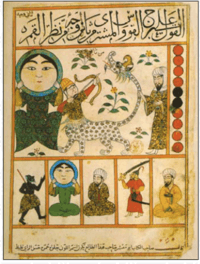Abu Ma'shar al-Balkhi
|
| |
| Full name | Abū Maʿshar, Jaʿfar ibn Muḥammad al-Balkhī |
|---|---|
| Born |
c. 787 Balkh, Khurasan[1] |
| Died |
c. 886 Wāsiṭ, Iraq |
| Era | Islamic Golden Age |
| Region | Balkh, Baghdad |
Main interests | Astrology, Astronomy |
|
Influenced
| |
Abū Maʿshar, Jaʿfar ibn Muḥammad al-Balkhī (also known as al-Falakī or Ibn Balkhī, Latinized as Albumasar, Albusar, or Albuxar) (10 August 787 in Balkh, Khurasan – 9 March 886 in Wāsiṭ, Iraq),[3] was an astrologer, astronomer, and Islamic philosopher, thought to be the greatest astrologer of the Abbasid court in Baghdad.[2] He was not a major innovator and as an astrologer he was not intellectually rigorous. Nevertheless, he wrote a number of practical manuals on astrology that profoundly influenced Muslim intellectual history and, through translations, that of western Europe and Byzantium.[3]
Life
Abū Ma‘shar lived in Baghdad. Early in his work as an academic he studied the hadith. It wasn't until he was 47 years old that he started studying astrology.[4]
Astrology and natural philosophy
He found influence in the work of Greek, Mesopotamian, Islamic and Persian scholars.[4] Richard Lemay has argued that the writings of Albumasar were very likely the single most important original source of Aristotle's theories of nature for European scholars, starting a little before the middle of the 12th century.[5]
It was not until later in the 12th century that the original books of Aristotle on nature began to become available in Latin. The works of Aristotle on logic had been known earlier, and Aristotle was generally recognized as "the master of logic." But during the course of the 12th century, Aristotle was transformed into the "master of those who know," and in particular a master of natural philosophy. It is notable that the work of Albumasar (or Balkhi), in question, is a treatise on astrology. Its Latin title is "Introductorium in Astronomiam", a translation of the Arabic Kitab al-mudkhal al-kabir ila 'ilm ahkam an-nujjum, written in Baghdad in the year 848 A.D. It was translated into Latin first by John of Seville in 1133, and again, less literally and abridged, by Herman of Carinthia in 1140 A.D. Amir Khusrav mentions that Abu Maʿshar came to Benaras (Varanasi) and studied astronomy there for ten years.[6]
Works
His works on astronomy are not extant, but information can still be gleaned from summaries found in the works of later astronomers or from his astrology works.[2]
Introductions to astrology

- Kitāb al‐mudkhal al‐kabīr, an introduction to astrology which received many translations to Latin and Greek starting from the 11th-century. It had significant influence on Western philosophers, like Albert the Great.[2]
- Kitāb mukhtaṣar al‐mudkhal, an abridged version of the above, later translated to Latin by Adelard of Bath.[2]
Historical astrology
- Kitāb al‐milal wa‐ʾl‐duwal ("Book on religions and dynasties"), probably his most important work, commented on in the major works of Roger Bacon, Pierre d'Ailly, and Pico della Mirandola.[2]
- Fī dhikr ma tadullu ʿalayhi al‐ashkhāṣ al‐ʿulwiyya ("On the indications of the celestial objects"),
- Kitāb al‐dalālāt ʿalā al‐ittiṣālāt wa‐qirānāt al‐kawākib ("Book of the indications of the planetary conjunctions"),
- Kitāb al‐ulūf ("Book of thousands"), preserved only in summaries by Sijzī.[2]
- Kitāb taḥāwīl sinī al-‘ālam (Flowers of Abu Ma'shar), uses horoscopes to examine months and days of the year. It was a manual for astrologers. It was translated in the 12th century by John of Seville.[4]
Genethlialogy
- Kitāb taḥāwil sinī al‐mawālīd ("Book of the revolutions of the years of nativities"). translated into Greek in 1000, and from that translation into Latin in the 13th century.
- Kitāb mawālīd al‐rijāl wa‐ʾl‐nisāʾ ("Book of nativities of men and women"), which was widely circulated in the Islamic world.[2]
Books available in Latin and Greek translations
- De magnis coniunctionibus, ed.-transl. K. Yamamoto, Ch. Burnett, Leiden, 2000, 2 vols. (Arabic & Latin text)
- De revolutionibus nativitatum, ed. D. Pingree, Leipzig, 1968 (Greek text)
- Liber florum Translated by James Herschel Holden in Five Medieval Astrologers (Tempe, Az.: A.F.A., Inc., 2008): 13-66.
- Introductorium maius, ed. R. Lemay, Napoli, 1995–1996, 9 vols. (Arabic text & two Latin translations)
- Ysagoga minor, ed.-transl. Ch. Burnett, K. Yamamoto, M. Yano, Leiden-New York, 1994 (Arabic & Latin text)
See also
- Islamic astrology
- List of Iranian scientists
Notes
- ↑ The Arrival of the Pagan Philosophers in the North:A Twelfth Century Florilegium in Edinburgh University Library, Charles Burnett, Knowledge, Discipline and Power in the Middle Ages, ed. Joseph Canning, Edmund J. King, Martial Staub, (Brill, 2011), 83;"...prolific writer Abu Ma'shar Ja'far ibn Muhammad ibn 'Umar al-Balkhi, who was born in Khurasan in 787 A.D. and died in Wasit in Iraq in 886..."
- ↑ 2.0 2.1 2.2 2.3 2.4 2.5 2.6 2.7 Yamamoto 2007.
- ↑ 3.0 3.1 Pingree 1970.
- ↑ 4.0 4.1 4.2 "Flowers of Abu Ma'shar". World Digital Library. 1488. Retrieved 2013-07-15.
- ↑ Richard Lemay, Abu Ma'shar and Latin Aristotelianism in the Twelfth Century, The Recovery of Aristotle's Natural Philosophy through Iranian Astrology, 1962.
- ↑ "Introduction to Astronomy, Containing the Eight Divided Books of Abu Ma'shar Abalachus". World Digital Library. 1506. Retrieved 2013-07-15.
References
- Pingree, David (1970). "Abū Ma'shar al-Balkhī, Ja'far ibn Muḥammad". Dictionary of Scientific Biography 1. New York: Charles Scribner's Sons. pp. 32–39. ISBN 0-684-10114-9.
- Yamamoto, Keiji (2007). "Abū Maʿshar Jaʿfar ibn Muḥammad ibn ʿUmar al‐Balkhi". In Thomas Hockey et al. The Biographical Encyclopedia of Astronomers. New York: Springer. p. 11. ISBN 978-0-387-31022-0. (PDF version)
External links
| Wikisource has the text of the 1911 Encyclopædia Britannica article Albumazar. |
- Abu Ma'shar: Prince of Astrologers by Robert Zoller
- Aḥkām Sinī al-maxālīd. Taḥāwīl.(1515) From the Early Printing Collection at the Library of Congress
| ||||||||||||||||||||||
